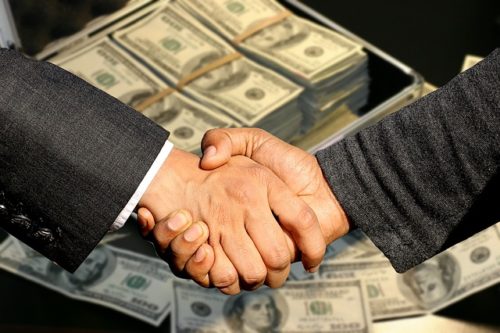How to Become Richer than Everyone
(Who is Like You)
Your success depends on how you exchange (give and take) with others, especially how you give.
If you try to get something for nothing or for very little, you end up broke.
If you are fair with people, and give something of value for something of equal value, you do well.
However, as described in this article, to get rich, you give more than necessary.
You have four types of exchange from which to choose.
Exchange Condition One
“1. First consider a group which takes in money but does not deliver anything in exchange. This is called rip-off.” — L. Ron Hubbard
Examples of this first condition of exchange:
— You pay a $1,000 deposit for a new car. The dealer goes bankrupt. You get no car and no refund.
— A plumber loosens a pipe, shows you the “leak,” tightens the fitting, makes noise and charges you $159.
— Someone in your office avoids working. He or she gives lots of excuses, lots of blame, lots of deception and no real work . . . but full pay.
This first type of exchange is theft. If you operate this way, no one trusts you for very long. You get fired from jobs. If you own a business, it fails.
Exchange Condition Two
The second exchange condition is cheating.
“2. Second is the condition of partial exchange. The group takes in orders or money for goods and then delivers part of it or a corrupted version of what was ordered.” — L. Ron Hubbard
Examples:
— A website promises you will become a terrific artist and earn $10,000 per month for your beautiful paintings. All you pay is $14.95 per month. However, all you get is a list of YouTube videos on how to paint. You also get problems if you try to cancel your monthly payments.
— You buy a “$299 Dream Vacation Weekend Package” which turns out to be a smelly motel room by the freeway.
— An employee spends a large part of his work time on Facebook, watching videos, chatting and looking for dates, all while being paid.
If this is your type of exchange, you should be fired. If you own a business, it barely survives or eventually fails. You never get rich.
Exchange Condition Three
“3. The third condition is the exchange known, legally and in business practice, as ‘fair exchange.’ One takes in orders and money and delivers exactly what has been ordered.” — L. Ron Hubbard
Most successful companies and individuals use this principle. Examples:
— You pay for a dozen fresh eggs, you get a dozen fresh eggs.
— A $15-per-hour employee works 40 hours of normal work and is paid $600.
— You paint houses and earn the average fee.
If you are in this third condition, you make an acceptable income. If you own or manage a business, it does fine. You save just enough money to survive your retirement years.
Exchange Condition Four
“4. The fourth condition of exchange is not common but could be called exchange in abundance. Here one does not give two for one or free service but gives something more valuable than money was received for.” “This fourth principle above is almost unknown in business or the arts. Yet it is the key to howling success and expansion.” — L. Ron Hubbard
Individuals and businesses who use this fourth method of exchange get rich. They do better than everyone else who produces the same VFP.
Examples:
— You pay the same price for a dozen fresh eggs, but the eggs are bigger and in a better package.
— You buy a Tesla and discover it keeps your dog cool when you are parked in hot weather.
— You invest with a real-estate group expecting a 12% return each year and get 18% instead.
— An employee not only does all of her own work, but she also trains a new employee, gladly works extra hours to help when another employee calls in sick and assumes new responsibilities without more pay.
— You get paid to paint a house, but you get the homeowner a better price on higher-quality paint, and you finish the job two days earlier than promised.
— You build a website for a small business that is so good, it doubles their income.
— You buy a “$299 Dream Vacation Weekend Package” that is not only in a nice hotel, but you also get two delicious breakfasts.
Employees who do more than they are expected to do receive promotions, raises, bonuses and extra benefits. Job security is excellent as they are more valuable to the company than most other employees.
Businesses that exchange in abundance have very happy customers who become loud fans. These businesses earn extra profit to put back into the business for expansion. They also make billionaires.
Examples
Amazon uses the fourth condition of exchange with millions of people around the world by providing an incredible selection of products at great prices. For a $139 annual membership, you also get free shipping, movies, music, games, ebooks and more. As a result, Amazon is one of the biggest, most successful companies in history.
Amazon’s competitors quickly fail if they use the first or second methods of exchange (rip-off or cheat). They may survive with the third method (fair exchange). If they match or beat Amazon’s generous type of exchange (fourth condition or exchange in abundance), they might hold their own with Amazon.
Other big companies you know also create billionaires by exchanging in abundance, such as Google, Apple, Microsoft, Samsung, Tesla and many others. Their services and products are incredible. They are richer and more successful than everyone else who tries to do the same thing.
At first, giving more than necessary may seem unfair. You add more value to your work or products, and no one seems to notice.
Yet if you persist, you rise to the top. More people like to work with you. Your company is selected above the competition. You have a waiting list of customers or clients. You earn a reputation of being “more than fair.”
Exchange in Relationships
You have exchanges with your family members, friends, coworkers, group members, colleagues and everyone else. Your success with these relationships depends on your exchange.
For example, you give and take . . .
— Time
— Interest
— Kindness
— Gratitude
— Favors
— Help
— Fun
— Advice
— All forms of support
For example, what does your spouse want from you? What do you want from your spouse? These are your exchanges.
In the first condition of exchange, the relationship fails. For example, a marriage ends in divorce if the husband drinks all day while his wife earns their money, cleans the house, raises their kids and so on. Or the wife refuses to work, spends all the money earned by the husband and constantly complains.
In the second condition of exchange, the relationship is unhappy and stressful. For example, a friend insists on doing all the talking. She tells you all of her troubles, opinions, plans and feelings. She expects you to just listen, agree with her and be kind to her. Or your neighbor constantly asks you for favors, loans and time, but can’t find time to help you build a fence between your properties.
In the third condition of exchange, both sides give each other equal exchange. For example, you and a coworker help each other, as needed. You support each other and work well together.
In the fourth condition of exchange, your relationships are amazingly good. Everyone gives more than the others expect. Examples:
The husband brings home more money than the family needs. The children do chores without asking. The wife makes dinners that are healthier and more delicious than ever. Everyone in the family is a little more grateful, kind and understanding than necessary which increases the mood of the entire family.
You and your neighbor have fun building a fence together as well as helping people with specials needs in the neighborhood.
You and a few of your friends enjoy giving each other encouragement, helpful ideas, jokes and gifts. Everyone is generous with their money and time. You feel joy whenever you get together.
Not only does the fourth condition of exchange make you wealthy, it gives you a great life to live.
Five Exercises to Help You Exchange in Abundance
1. How can you give MORE than people expect from you, your group or your company?
2. How can you INCREASE the value of your work, your service or your products?
3. How can you do a BETTER job than everyone like you?
4. How can you work FASTER, more EFFICIENTLY and with HIGHER QUALITY?
5. How can you put MORE into your relationships than necessary?

